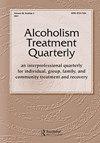折衷复制的政策和科学意义
IF 0.9
Q4 SUBSTANCE ABUSE
引用次数: 0
摘要
摘要复制和与其他研究人员共享数据已成为科学过程的重要组成部分,这是社会科学的一个方面,在过去几十年中呈指数级增长,现在大多数联邦资助的研究都需要它。不幸的是,对于复制者和提供数据集的人之间的意外复杂性,几乎没有指导方针或叙述。本文是一项案例研究,复制了一项对270名涉及刑事司法的药物使用障碍患者的研究,这些患者被随机分配到自助康复院、专业领导的治疗社区或对照条件下。复制者和最初的调查者对监禁后的关键结果得出了不同的结论。这些类型的差异可能会产生关键的政策影响,特别是因为很少有随机研究来检查从监狱和监狱释放的人的监禁后结果。形成对比的结论在一定程度上是由于在各种概念和方法问题上的差异。为了避免这些类型的困难,我们提出了几类建议,旨在加强复制研究和二次使用数据集的科学过程。本文章由计算机程序翻译,如有差异,请以英文原文为准。
Policy and Scientific Implications of Compromised Replications
ABSTRACT Replications and the sharing of data with other researchers have become an essential part of the scientific process, and it is an aspect of the social sciences that has grown exponentially over the last few decades and is now required for most federally funded studies. Unfortunately, there are few guidelines or narratives for unexpected complications between replicators and those providing the data sets. The current article is a case study regarding a replication of a study of 270 criminally-justice involved individuals with substance use disorders, who were randomized either to self-help recovery homes, professionally led therapeutic communities or a control condition. The replicators and the original investigators arrived at different conclusions regarding critical post-incarceration outcomes. These types of discrepancies can have critical policy implications particularly as there are so few randomized studies examining post-incarceration outcomes for those released from jails and prisons. The contrasting conclusions were, in part, due to differences in a variety of conceptual and methodological issues. To avoid these types of difficulties, we propose several types of recommendations designed to enhance the scientific process for replication studies and secondary use data sets.
求助全文
通过发布文献求助,成功后即可免费获取论文全文。
去求助
来源期刊

Alcoholism Treatment Quarterly
SUBSTANCE ABUSE-
CiteScore
1.60
自引率
11.10%
发文量
31
期刊介绍:
Alcoholism Treatment Quarterly is an exciting professional journal for clinicians working with persons who are alcoholic and their families. Designed to bridge the gap between research journals and information for the general public, it addresses the specific concerns of professional alcoholism counselors, social workers, psychologists, physicians, clergy, nurses, employee assistance professionals, and others who provide direct services to persons who are alcoholic. The journal features articles specifically related to the treatment of alcoholism, highlighting new and innovative approaches to care, describing clinical problems and solutions, and detailing practical, unique approaches to intervention and therapy.
 求助内容:
求助内容: 应助结果提醒方式:
应助结果提醒方式:


